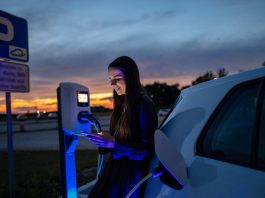A research team from the National University of Singapore has revealed the necessity of reliable EV charging networks when it comes to encouraging EV adaptation.
Scientists have noted that failure to properly plan resilient and reliable EV charging networks could be a detrimental weakness that undermines efforts to encourage the large-scale adoption of electric vehicles (EVs). This conclusion was reached after a critical examination of the effects of shocks – sudden unanticipated events – on electric vehicle (EV) charging infrastructures.
The importance of encouraging EV adoption
A majority of governments consider encouraging the large-scale adoption of EVs as a ‘key pillar’ of efforts to build a carbon neutral economy, reduce urban pollution, and reverse the impact of climate change.
Thus, policymakers have a propensity to concentrate on incentives that encourage consumers to purchase EVs, with much less focus on incentivising developers to build adequate and resilient and reliable EV charging networks to support an expanding fleet of EVs.
Singapore, for example, has set an ambitious goal to shift the nation to all EVs by 2040, and it has even been suggested that this could be bought forward, as well as initiating an early adoption incentive scheme for consumers buying EVs.
However, in this study, led by Assistant Professor Jimmy Peng of the National University of Singapore’s College of Design and Engineering, researchers discovered that shocks to parts of an EV charging network can have significant and unexpected ripple effects. In turn, these could derail attempts at increasing adoption by damaging public confidence in the support of the infrastructure and, as a result, the usability of EVs.
The impact of flooding shocks on EV charging infrastructure
Scientists focused their analysis on the impact of flooding shocks on an EV charging infrastructure in an urban setting, utilising data gathered from charging stations in the UK’s Greater London area to examine its impacts.
The research team has observed that with flooding incidents becoming more frequent and intense as a result of climate change, flood shocks are rapidly becoming a factor impacting the accessibility of EV charging stations.
Furthermore, by analysing driver behaviours when some EV charging networks are removed from service as a result of flooding, the team were able to examine changes to the accessibility and availability of other chargers in the network.
“Contrary to expectations, we found that the impact of flooding shocks affects charger accessibility not just in the immediate areas around flooded zones, but significantly farther away – even over ten kilometres from the flood-hit area,” explained Assistant Professor Peng, from the Department of Electrical and Computer Engineering.
“The data from our study shows that these impacts are most concentrated in already stressed parts of the charging network. In other words, charging stations that were previously in high demand experience an even higher increase in demand, meaning that specific localities are likely to be easily overwhelmed when floods or other shocks occur.”
Stress on EV charging networks will grow as EV adoption increases
The team modelled the process to simulate what happens following flooding shocks to the EV charging network with increasing levels of EV ownership.
Their analysis demonstrated that this stress on the network would get significantly worse as EV adoption grows. Peng emphasised that unless policymakers take proactive steps to address it, stress on the network could become a significant deterrent to consumers switching to EVs – essentially, reliable EV charging networks is a necessity for EV owners.
“If we do not do the incentivisation to build a charging infrastructure that keeps pace with or even ahead of ownership, what will happen is that it will backfire on your transition policies. Because if I, as an EV owner, suffer maybe even only once in a year from not being able to charge my vehicle when I want to, that still really raises questions about the usability and practicality of EVs,” said Peng.
Is it enough to plan for the growth in EV ownership?
Furthermore, for officials attempting to encourage the adoption of EVs, Peng speculates whether it is appropriate to consider whether a planned investment in charging infrastructure is adequate for the planned growth in EV ownership.
In the case of London, for example, the team’s modelling suggests that approximately 5 to 10% additional chargers are required to mitigate additional stresses to the EV infrastructure triggered by flooding shocks.
A majority of these new chargers should be located in areas of already high usage, which fortunately for policymakers, will be naturally profitable for the charging companies. However, some will also require to be placed in far-flung areas, which experience lesser demand – apart from at times of shock to the wider infrastructure – in order to supply reliable EV charging networks.
The research team emphasised that the government can step in to help offset some of the costs and improve public confidence in the accessibility of reliable EV charging networks. Additionally, it was noted that strong public confidence in the EV charging infrastructure is an essential part of encouraging the wider long-term adoption of EVs and meeting carbon reduction targets.
“Our basic message to policymakers is that you cannot just adopt a generic plan, for example achieving a certain target for the number of chargers, and assume it will be okay,” concluded Peng.
“If you are going to incentivise the population to transition to EVs, it is not a one-off transaction. You have to look ahead to usage in ten years or even further and take into account other critical factors, such as the geography and the environment.”









